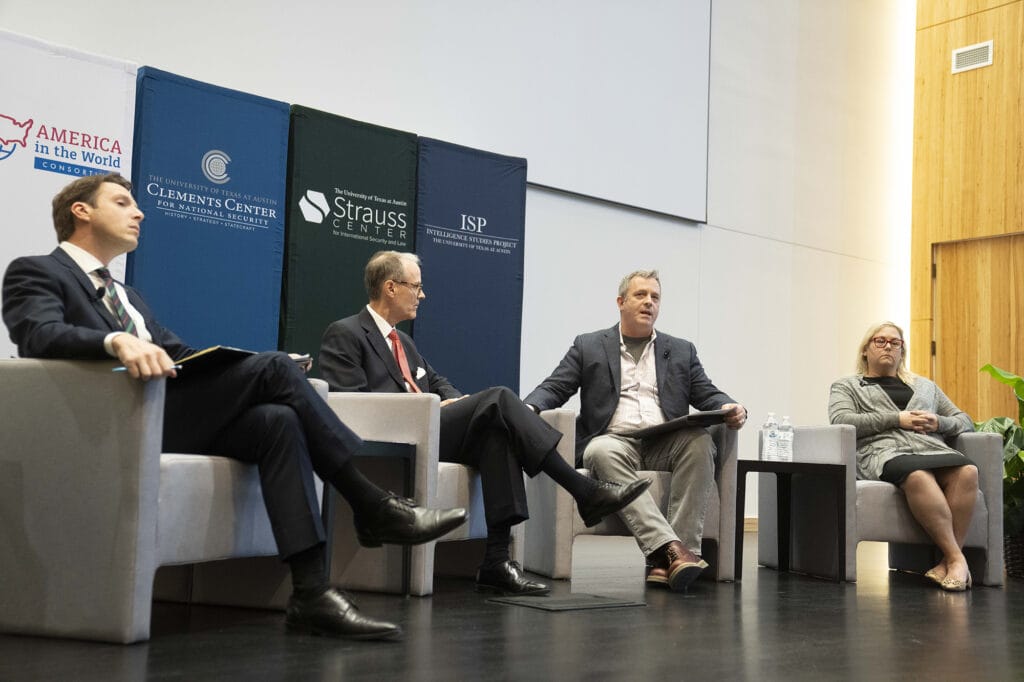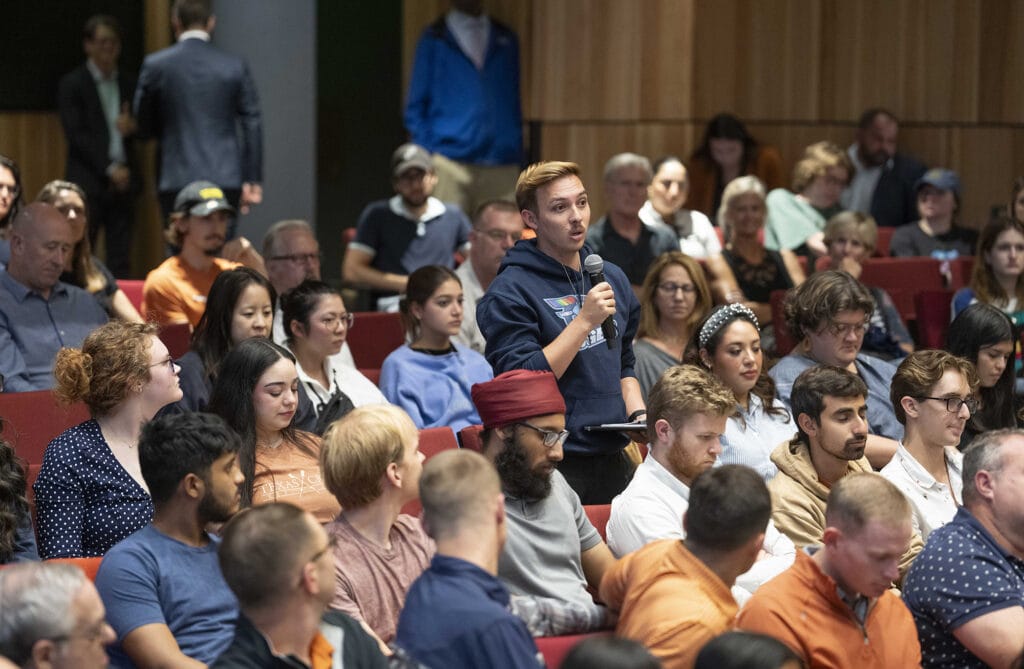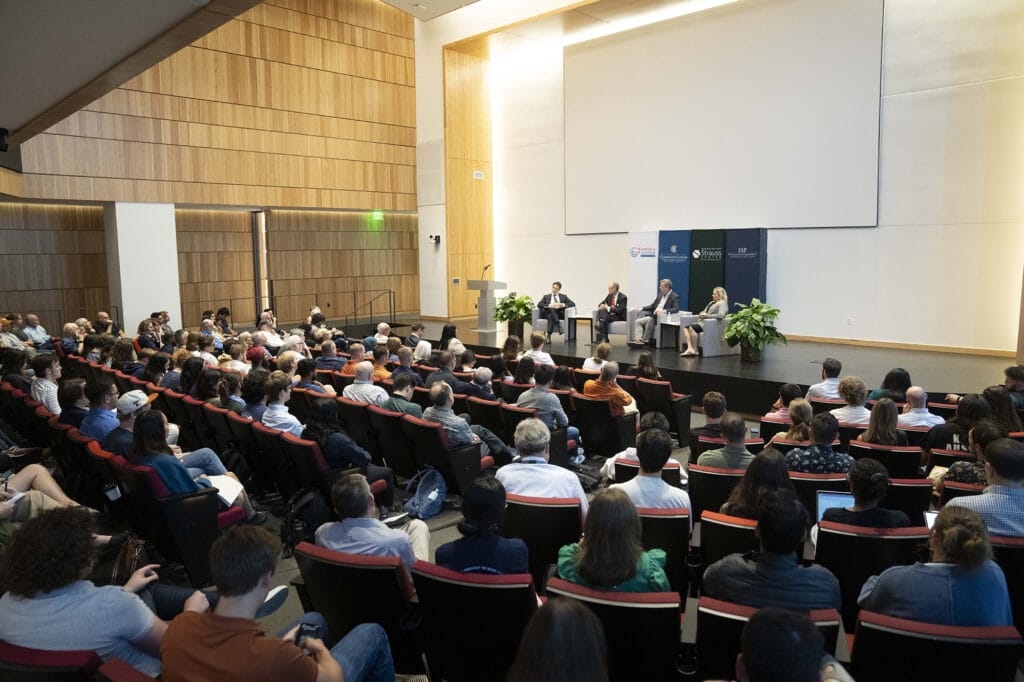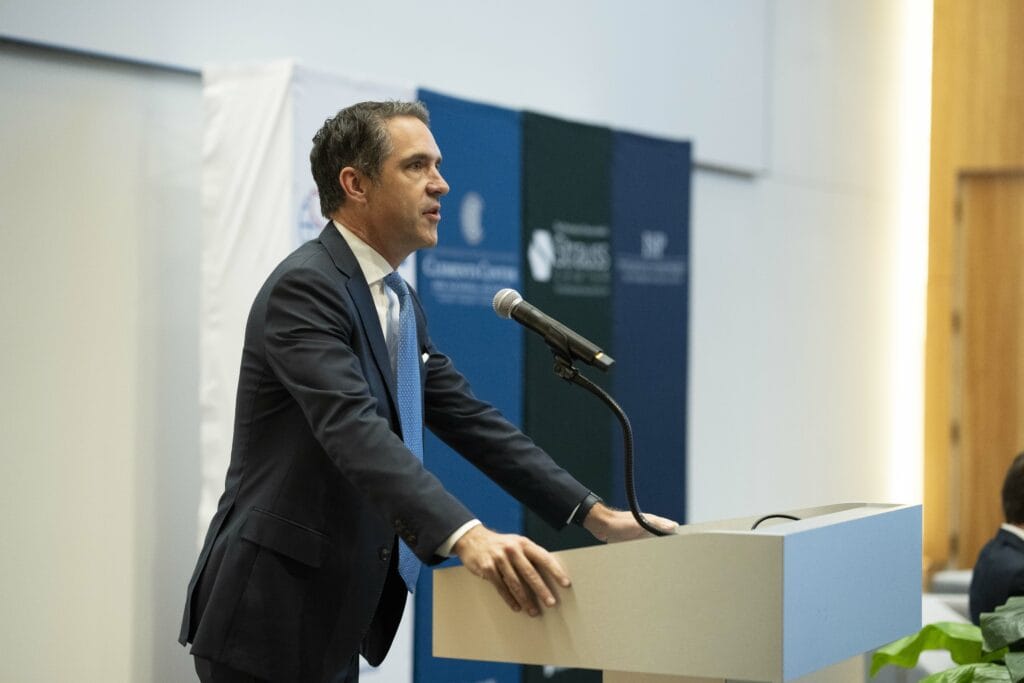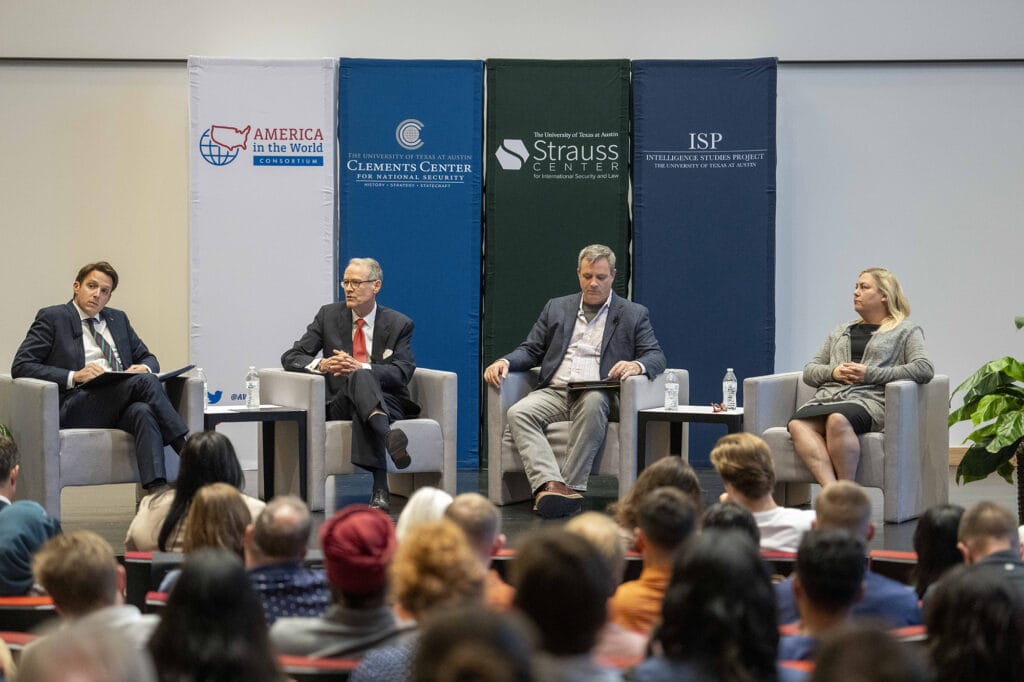Clements hosts panel on October 7th Hamas attack on Israel
Oct 20, 2023
Last week, the Clements Center for National Security, the Strauss Center for International Security and Law, the Intelligence Studies Project and the America in the World Consortium brought together Stephen Slick, Paul Edgar, Simone Ledeen and Adam Klein for a conversation on the Hamas terrorist attacks in Israel, the likely Israeli response, and the broader implications of the regional conflict.
Bobby Chesney, Dean of the UT Law School, opened the event. In his introduction, he reflected on the tragic targeting of civilians by Hamas, the jaw-dropping scale of the attack, and the egregious disregard to the longstanding ideal that it is not right to kill innocent civilians to advance one’s political or social goals. Chesney emphasized, “Ends do not and cannot justify such means.” Adam Klein, Director of the Strauss Center, took the floor next. He considered the role of the Clements and Strauss Centers during moments like this, insightfully noting that our job is to facilitate an educational forum for the challenging questions that naturally accompany such events. We probe what is known and unknown, we share our knowledge about the region and its unique characteristics, the consequences for international order, and the constructive work of American policy. We provide a forum where these things can be discussed openly and civilly.
Each panelist took a few minutes to speak on the attacks. Steve Slick, Director of the Intelligence Studies Project, spoke to the audience about the intelligence implications for U.S. policy makers. He remarked that it is too early to say if there was an intelligence failure on the part of Israel and recommended withholding judgement until all of the facts are examined by a neutral commission of investigators. Slick believes that considering Israel’s extensive intelligence collection, inquiries will find that multiple reports did exist, which in hindsight can be linked to the attacks. However, they may not have been understood in context as indicators of an attack, or were understood but not conveyed persuasively to senior officials. He also discussed the role of U.S. intelligence, noting that we have close relationships with Israeli counterparts, and we will rely heavily on our Israeli partners for our own intelligence collecting in our efforts to prevent the conflict from spreading.
Paul Edgar, Interim Executive Director of the Clements Center, spoke on military operations in Gaza and what future operations might look like. Edgar noted that while Israel’s current countermeasures are mostly limited to airstrikes, they are massed near the Gaza border, determining their ground objectives, and organizing a combined arms task force accordingly. Regarding the role of the United States in the conflict, Edgar notes that while the IDF is focusing on Hamas in Gaza, U.S. diplomats are connecting with their regional counterparts who can help dissuade Hezbollah and others from causing more problems for Israel. The U.S. is also moving carrier groups to the Mediterranean to signal that we may be willing to use our military assets against Hezbollah and others who might want to grow the conflict. Edgar also gave a practical assessment of the Hamas attack, noting that as a terrorist attack it was successful, but as a military operation with a political goal, it borders on insignificant. It depleted Hamas’ resources, and Hamas is not capable of defeating an invading Israeli force. Based on many years of experience with Israeli security officials, he predicted that the entire organization of Hamas will no longer exist within a few years, a sentiment reflected by Israeli spokesman Lt. Col. Richard Hecht, “We plan to get to every one of these people – every single one of them.”
Simone Ledeen, Former Deputy Assistant Secretary of Defense for the Middle East, noted how important it is to understand the timing of the invasion. “It happened now because normalization with Saudi Arabia was about to happen. Iran simply could not allow that to happen.” Ledeen stressed the importance of considering how other countries in the Middle East will react to what Hamas is doing and how Israel will respond. Ledeen pointed out that the attacks went against the status quo and the standard rules of engagement, and other players in the region are reacting strongly to the level of barbarity and violence that was conducted.
Adam Klein posed several questions to the panelists, the first to Slick on why Hezbollah has not entered the fray yet. Slick points out that while Iran has long been a financial backer of Hamas, it’s too early to know if they were the architect or specific master of the attack and to beware of misinformation coming out of the region. Slick believes that if Hezbollah does get in the fray, that may be evidence that this is part of a choreographed set of activities by Iran. However, he notes, Hezbollah is Iran’s most valuable asset and that they might not utilize them in this fight because they recognize that they would be destroyed. Klein pivoted the conversation to the hostage situation, especially the prognosis for the American hostages. He gave an overview of the principles of armed conflict, highlighting that hostage taking and use as leverage is expressly forbidden under international law. Slick and Ledeen Steve Slick of mentioned how difficult hostage situations are to resolve. Prof. Slick spoke on the likelihood of Egypt playing an important role in mediation.
When asked about U.S. capacity to assist both Israel and Ukraine in two separate wars, Dr. Edgar noted that while we do have the capacity to assist, broadly speaking, “We’re talking preparation to assist in terms of years and not days, weeks, or months. The U.S. has demonstrated in the past that we have the capacity to fight two enormous wars in two enormously different parts of the globe, and we do have the option to engage further in a way that does not necessarily neglect responsibilities domestically.” Ledeen countered that our manufacturing capacity is not meeting demand, and we are years behind in several key munitions. Therefore “We have a capacity issue in my opinion. And we need to be very clear-eyed about it.”
Click here for more pictures.
Missed the event? Listen to the podcast.
